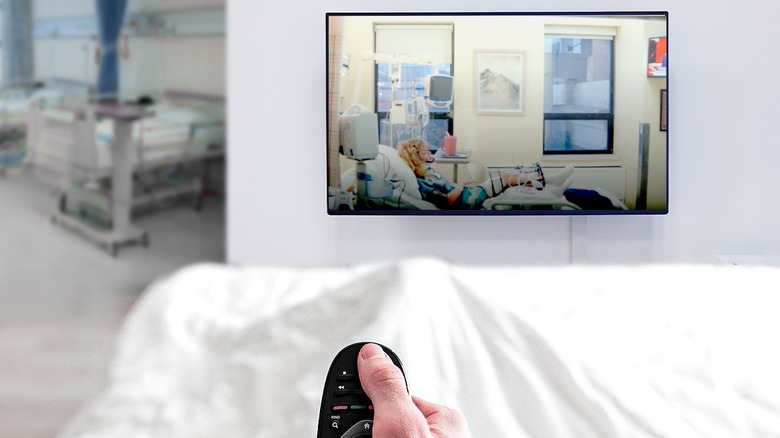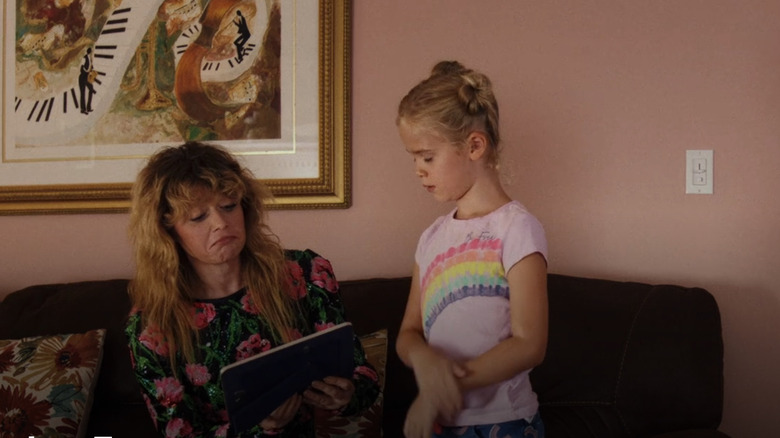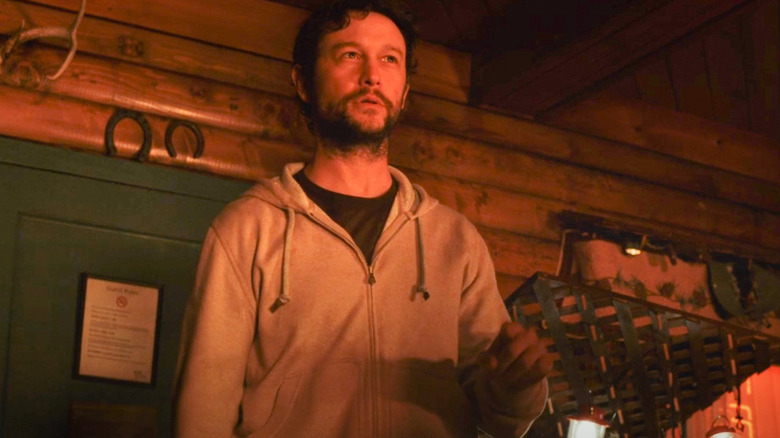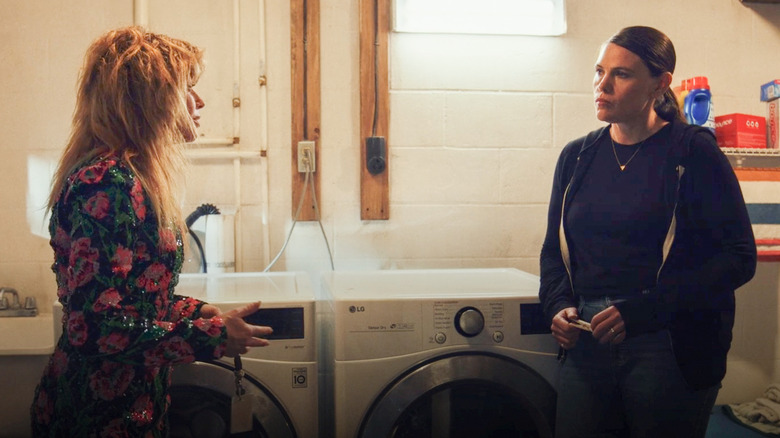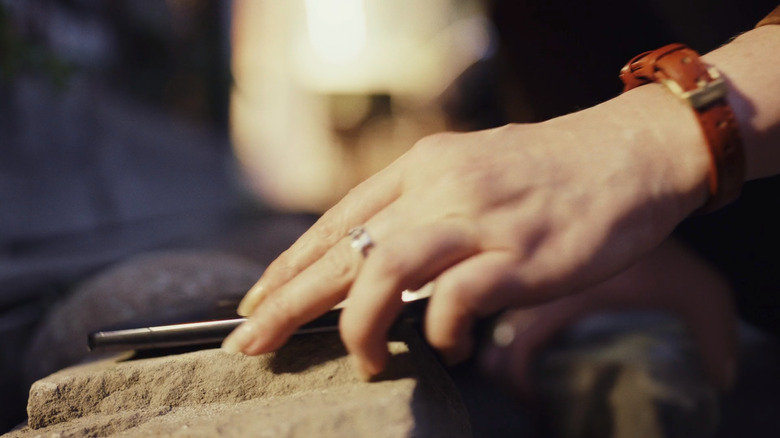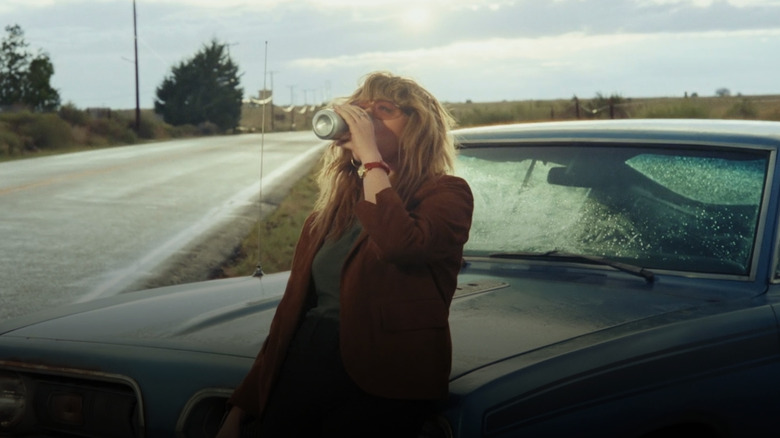Poker Face's Hospitalization Storyline Reminded Me Of My Own, & I've Never Identified With A Character So Closely
The Season 1 finale of "Poker Face" begins with Charlie Cale (Natasha Lyonne) getting released from the hospital after a two-month stay, paid for by former boss and pursuer Sterling Frost Sr. (Ron Perlman). For me, the year 2022 ended with a stroke, followed by a series of emergency room visits in Mexico, Oregon, and New Jersey.
My recent hospitalization experiences are just one of many ways I feel a tight kinship with Charlie Cale, the lie-detecting nomad with a potentially fatal fondness for a particular way of living. As shown on the show, Charlie and her sister Emily (Clea DuVall) grew up in Atlantic City, swimming in the waters of the many bays and inlets that make up the New Jersey coastline. I was born and raised a little more than an hour north of that same place, and I misspent much of my teen and college days just a quick boat ride from the Atlantic City boardwalk in the small fishing village of Mystic Island.
Charlie and I also share a fondness for road tripping in old cars. Hers is a '69 Plymouth Barracuda, while I have mostly favored old Jeeps, but for several years drove a 1964 Plymouth Valiant convertible. Throughout Season 1 of "Poker Face," Charlie hops from place-to-place evading Sterling's henchman Cliff Legrand (Benjamin Bratt), making stops in Texas, Tennessee, and Colorado; those are just three of the 15 states I have called home (13 in the US, and two in Mexico).
However, such a lifestyle comes at a cost. While putting all of those miles on various vehicles, I was also racking up miles on my body and brain, filling it with bourbon and red meat. And because of how my own hospital stay changed me, I think that I understand the choices Charlie makes in the "Poker Face" finale more than most.
For Charlie and me, adaptability is a learned trauma response
While having such a rootless existence has given both Charlie and me the chance to live a tremendous variety of experiences and meet a fascinating array of people, it is a tremendously exhausting way to go through life. In Episode 10 of "Poker Face," Charlie explains to her niece Shasta (Willa Dunn) that she and her sister learned to swim from getting thrown off their father's boat and being forced to swim to safety. It wasn't a choice. "I like swimming," Shasta says to her aunt. "I hate it," Charlie replies. "Then why did you do it?" the young girl asks sweetly.
Charlie sighs, before explaining that the skills we end up with are sometimes learned responses to trauma. "You end up in the water, what else you gonna do, right?"
Like Charlie, in my own life, I became used to flight as a way to deal with stressful or dangerous situations. Constant movement might have kept me comfortable, but in most situations, that mechanism just moved me from one proverbial frying pan to another. On "Poker Face," Charlie's threats are external, as she becomes a magnet for murderous villains across the nation. For me, my threats came from my own body, as I developed one autoimmune condition after another (Type 1 diabetes, hypothyroidism, and celiac disease). Those conditions, in turn, caused further health complications — high cholesterol and blood pressure — all of which contributed to an elevated stroke risk as I got older.
My health crisis was my Trey Nelson
My health woes kept adding up. On top of what I already listed, add on a serious bout with COVID-19 in spring 2020, and my cardiovascular system became a feebly ticking time bomb.
While Charlie ends up getting stabbed and dumped in a hollow tree by serial killer Trey Nelson (Joseph Gordon-Levitt), I was in an Airbnb in La Ventana, Baja California Sur when I suddenly started slurring my words. I lost control of my left arm and the ability to walk more than a few steps at a time. After some emergency stabilization in nearby La Paz, I called in some favors from some newly made friends in Mexico to get myself and my dog Dexter safely back to Portland for the next step in my medical treatment.
A few months later, I am back in New Jersey, on the path to what I hope is a full recovery. Ironically, I am now renting a carriage house from an old friend in Port Republic, less than 20 miles from Charlie Cale's childhood home.
As seen on Poker Face, the people closest to us often don't understand the life we lead
Before she says another goodbye to Emily, Charlie asks her sister if she thinks they can try and repair their relationship someday. Emily testily tells her that this is not the life she chose, and Charlie asks, "You think I chose this? You think I like living like this?"
Emily scoffs and replies, "I don't care. I mean, yeah. You know what? Yeah. It's the life you got. And someday, you're gonna have to admit you chose it. This is not just a series of situations you keep getting reeled into. You choose to be out there, wherever the f— you are, just swimming free, cool and breezy ... you got a good heart. You choose to spend it on strangers, and then breeze on down the highway."
I also have family members who don't quite understand my decisions to move so frequently, and so far away. But while neither Charlie's nor my circumstances are 100 percent the result of our own choices, we are solely responsible for dealing with their outcomes. For both of us, the best way to do that is to continue down the road to the next adventure, whatever or wherever that may be.
For Charlie Cale and me, the best choice is not often going to be the safest choice
When Charlie escapes the law after Cliff tries to frame her for Sterling's murder, she turns down an offer to work for Beatrix, and hits the road again. I have a similar decision ahead: I can stay here in Atlantic County, close to family and friends and what was once familiar, or I can find myself another old Jeep and head west and south for Baja once again. I have a few more months of physical therapy and saving to do before that decision needs to be made, but at the moment I seem to be leaning the same way Charlie does at the end of Season 1 of "Poker Face" ... although, to be fair, I doubt that I will be smashing my cell phone with a rock before I hit the road.
For both Charlie and me, the most prudent choice, following our life crises and hospitalizations, would be to stay in New Jersey and try to find a way to be comfortable in a place that has always made us feel perpetually in crisis. Maybe the prudent choice, though, isn't the right choice for who we are.
As Poker Face shows, living true to oneself means sometimes taking risks
There is an old adage that goes something like this: "Ships are safest in port, but that's not what ships are for."
Charlie — like me — is happiest when her ship is at sea, even though that is where risk is greatest, and where danger is literally all around her. Being out on the road and living without roots gives her a sense of home that can't be found by staying in one place, which is the best explanation for why she feels most at peace living a life without a true home base. Following the crisis she just survived, this choice might seem strange to many, but to me, I feel it deeply in my bones. Because I can easily see myself making the same decision.
Now, there are some adjustments that I have no choice but to make: I have eaten my last hamburger and enjoyed my last alcoholic drink, for instance. Such things have previously brought comfort to me throughout all of my wanderings and moves back and forth across the continent. As I go into the future — and as "Poker Face" heads into Season 2 — I will be searching for new, healthier habits to guide me through my next series of travels, but I don't expect to abandon the open road itself.
